We had left the pleasant uplands of Glen Shee for the
sands, the waves, the bracing breezes of Nairn—and to our dismay Nairn
was full already. We had then turned our eyes to the varied coastline
opposite, stretching away for league upon league toward the Orkneys, and
had resolved to try Tain. We had found Tain peaceful and picturesque—but
alas! its shores were not for the feet of the paddler or the spade of
the digger, and so we had sped northward still, to Golspie. And at
Golspie we had found all that we craved. On the north of the bay, where
we first sought it, there was just sand enough—we had not yet seen the
miles of smooth sand which lie south of the village. Before us, across
the steely sea rose far and dim the line of Moray hills; while in front
of us the seabirds swam, wheeled, and settled. Behind, brown kye and
snowy geese were dotted over a broad belt of green pasture. To left
stood the woody heights and gleaming turrets of Dunrobin. To right swept
a low shore backed by a crescent of mountains. And Golspie Burn! with
its beautiful fall, babbling rapids, and clear pools of
brown water ! its rocks and trees and ferns and mosses! and its
dusky rabbits scudding away wherever
we bent our steps! Yes, certainly
we should have found content at Golspie—even if the Sutherland
Arms had been less homelike; even if our host, the
Duke's whilom gardener, had not joined to it one of the most delightful
of simple old-fashioned gardens; even if every noontide a robin (or was
he an enchanted prince?) had not come in at the
window and by his example
gracefully invited us to partake of the newly spread luncheon.
I had gone into the village one morning to buy
something, and as I came back the boys and girls were at play in the
steep playground which slopes down from the School
to the road. I stood looking at them, and especially at a
game which some of the girls were playing. They
were dancing in a ring, reciting as they danced, and then they
would suddenly reverse and dance the other way
round, still reciting. Presently some of the younger ones—children of
perhaps seven or eight— came down and formed a
ring in the road before me. In a minute or two some of the older girls
did the same. I thanked them all and spun up a
sixpence for them to scramble for: then they had to go back into school
and I went on to the Sutherland Arms. There I sat down
and wrote the proposal for a prize-competition from which you
will find some extracts at p. 328.
Not being quite certain how
that proposal might be generally received, I took it to the Minister of
the Established Kirk at Golspie, Dr. Joass, a geologist and
archaeologist of far higher than 'local' rank, and always ready to help
those who come to him. Armed with the assurance of
his sympathy, I next approached Mr.James H. Loudon, the then master of
the school, now a master in Kelvinside Academy,
Glasgow. He at once entered heartily into the plan, and it is to him
that I owe the possibility of carrying it out.
In February 1892 Mr. Loudon
sent me, as the result of my proposal, the essays of the seven girls and
boys whose names are on the title page. At p. 331
you will see some particulars as to their ages,
parentage, and places in the competition at large and in the several
branches of it. As six out of the seven afterwards won
'district prizes,' it cannot be said that the competitors were
not a good representative team.
The
italicized extracts from those essays
which form the basis of this book are in the exact
words and spelling of the originals and each is followed
by its writer's initials: everything else, including notes and
headings, is mine. But I have not felt myself bound to follow the
writers in their punctuation (in which I include the hyphen and
apostrophe), their use of capitals, or their division into paragraphs or
verses.
It would have been easy to bestow on the editing all
my leisure for several years. I have not been able to spare the time for
that; and what is wanted at present is not so much
to comment as to collect. If the folklore of the
entire kingdom were collected and classified, it
would to a great extent annotate itself Nevertheless I have tried
by explanation and illustration to
make a substantial contribution of my own
to the study of British folklore. The chief books
and articles which have been consulted for the purpose of annotating the
work of the contributors I quote for brevity
by author and page only: they are these :—
Dempster (Miss) The folk-lore of Sutherlandshire. In
the Folk-lore journal, vol. 6, 1888.
Napier (James) Folk lore: or, superstitious beliefs
in the West of Scotland within this century. 1879.
Gregor (Rev. Walter) Notes on the folk-lore of the
North- East of Scotland. 1881 (Folk-Lore Soc, vol. 7).
Henderson (W.) Notes on the folk-lore of the Northern
counties of England and the Borders. 1879 (Folk-Lore Soc, vol. 2).
Shropshire folk-lore. Ed. by Charlotte S. Burne from
the collection of Georgina F. Jackson. 1883.
Choice notes from ' Notes and Queries,' Folklore.
1859.
Chambers (Robert) Popular rhymes of Scotland.
Northall (G. F.) English folk-rhj'mes. 1892.
Halliwell (James Orchard) Nursery rhymes and nursery
tales of England—an undated edition containing xv + 352 pp.
Udal (J. S.) Dorsetshire children's games, etc. In
the Folk-lore journal, vol. 7, 1889.
Newell (William Wells) Games and songs of American
children. New York, Harper & brothers. 1884.
Bolton (Henry Carrington) The counting-out rhymes of
children. 1888.
Allen (Miss) Children's game-rhymes. Copied down from
word of mouth by Miss Allen, School house, Hersham, Surrey. In the
Folk-lore record, vol. 5. 1882.
Gomme (Mrs. Alice Bertha) The traditional games of
England, Scotland, and Ireland. 2 vols.—being pt. i. of 'A dictionary of
British folk-lore ed. by G. Laurence Gomme.'
All the parts of my book which
deal with games had been written before I saw the announcement of Mrs.
Gomme's very valuable work. The
first volume of that was published in 1894, and, although it
contained no games from North of the Moray Firth,
it afforded me some new illustrations from other
parts of the country. I was anxious to get the benefit of her second
volume as well, and, since it had not appeared up
to the spring of 1896, I took a friend's suggestion and asked her
publisher if she would exchange proof-sheets with me. This she has very
kindly done, as far as hers were ready (down to ' Sally Waters', and I
hope my young Golspie friends and I may have
furnished to her as much aid as she has to me. All
my obligations to her are separately acknowledged. Visiting Golspie a
third time in 1893, to complete my book, I came by chance to study the
Pictish inscriptions of Scotland, Orkney, and Shetland, which had not
hitherto been solved. Their solution will be found in my
work on ' The vernacular inscriptions of
the ancient kingdom of Alban,' published in 1896,
which I cite simply by my own
name. Its preparation and printing kept back the present volume
for more than two years, but my new
study furnished so much additional
information which I have been able to use in these pages that the delay
proved ' a blessing in disguise.' Before I came to prepare them I had
merely browsed now and then on folklore, as on
much else, in a very casual kind of way. There is
a Folk-Lore Society, which has many distinguished
men among its members, which has published and
continues to publish a valuable journal and important works—among
them being a Handbook of Folklore^ which is
priceless, and only costs half a crown. If I may offer to that Society
some suggestions which occur to me, they are these. Instead of being a
London society without branches, start, if 3'ou
can, a branch in every town and considerable village in the kingdom, and
set about collecting. And, when you do so, begin
with the young. They will collect for
you not only from those of their
own age but from their elders as well. And, if a stray tourist
can so easily obtain in one small place in our furthest North the amount
of curious matter which you will find in these pages, by
way of answer to his few hastily prepared queries, what cannot
you collect by organized effort? Try, gentlemen,
try. The public will surely help you, if you ask
it ; for we have all been children once, and
many of us would be glad to be children again.
It is, of course, not only primary schools which
should be encouraged to furnish such collections, but secondary schools
as well. And to those who are interested in our ' grammar
' and ' high ' schools I would say—Offer prizes not merely for
collections of the folklore of a district, but for collections of its
old songs; for vocabularies of its dialect; for accounts of its general
history and antiquities, of the history of its peopling, of the history
of its industries. By so doing you will store
up valuable material which is rapidly being lost,
and which, if it should not attain the dignity of a separate
publication, the editor of the nearest newspaper will gladly preserve in
print. You will also be leading the boys and girls
themselves to take an interest in subjects of importance which are not
included in their school-learning. And you will be getting them to teach
themselves what South British schools and universities at any rate
rarely attempt to teach them—the art of research. Why is the annual
literary output of Germany so much
more valuable than that of the British isles? Mainly, I believe,
because every German university student has to
undertake, and publish the results of, some
approved investigation before a degree is granted him. He has learnt to
seek for himself and to draw conclusions for himself^ and to love doing
these things. But, as far as the training he has had from his school and
his University goes, the ordinary English B.A., who
has not passed through a natural science course, is almost always
in the position of Rudyard Kipling's Tomlinson, the weak
dependent soul whom Peter drove from the gate of Heaven and
whom the Devil scorned to let into Hell —
'This I have read in a book,' he said, 'and that was
told to me,
And this I have thought that another man thought of a Prince in
Muscovy.'
If the following pages do anything to stimulate in
these ways the collection of folklore, they will
not have been written in vain. Nor will they if,
by giving to any of the young
folk of Golspie itself some idea of the wealth of their
own neighbourhood in what is ancient and curious,
they lead any such boy or girl to study its folklore, its antiquarian
remains and history as an inhabited place, or its geology—and to put the
results of that study some day on record, for the
interest and instruction of their fellow-countrymen, in a volume
much more adequate than this.
For my chapter on 'The Place
and its Peopling' has as little pretension to be a history of Golspie as
the earlier part of the book has to be a complete collection of its
folklore. But some account was needed of the 'folk' among
whom the 'lore' is current, and of their antecedents. How
much that account owes to Dr. Joass I can hardly
estimate. It was he who first described to me, and
who personally showed me, the weem, the hutcircle,
the earth-house, and the broch. And — although I have everywhere read
and thought for myself, and am alone answerable for any error of fact or
judgement w^hich can be discovered—I have received from him in other
parts of that chapter so much correction or
assistance, beyond what is there acknowledged, as to leave me greatly
his debtor for whatever value I have succeeded in giving to it.
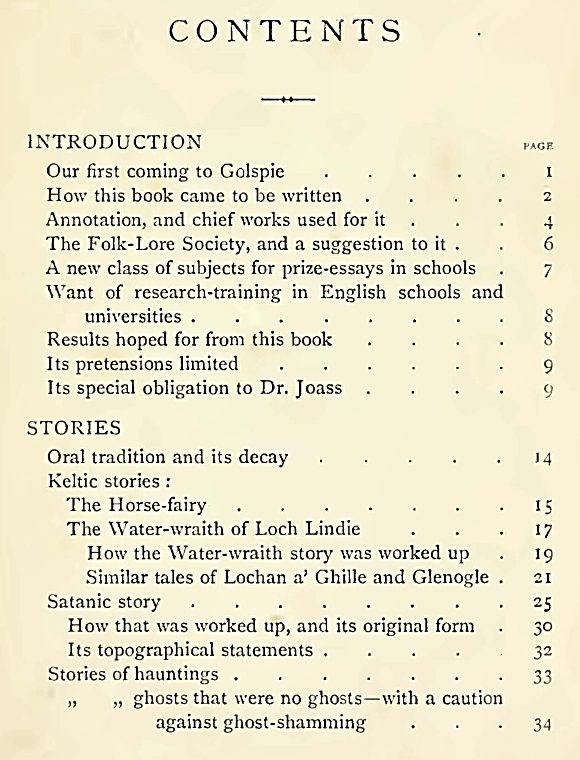
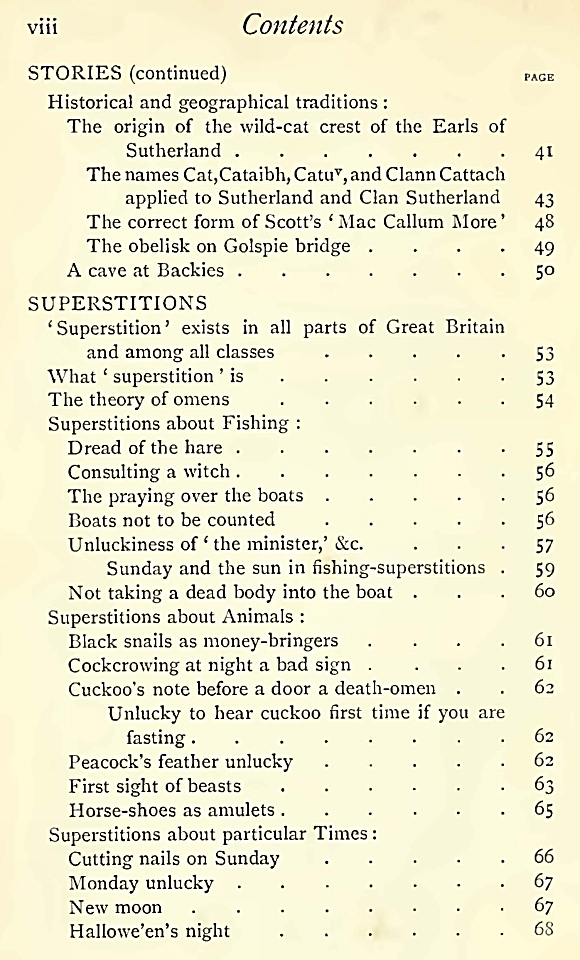
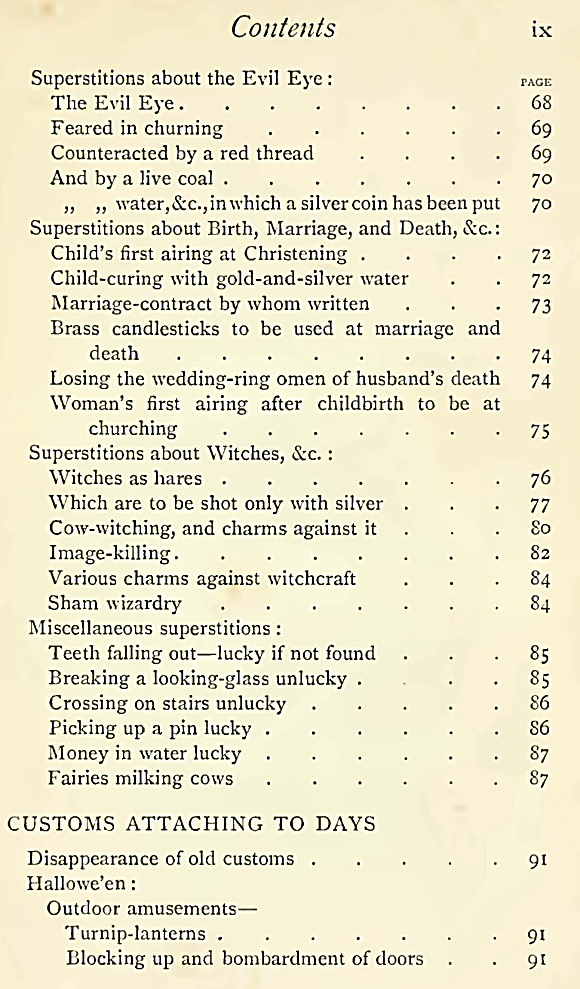
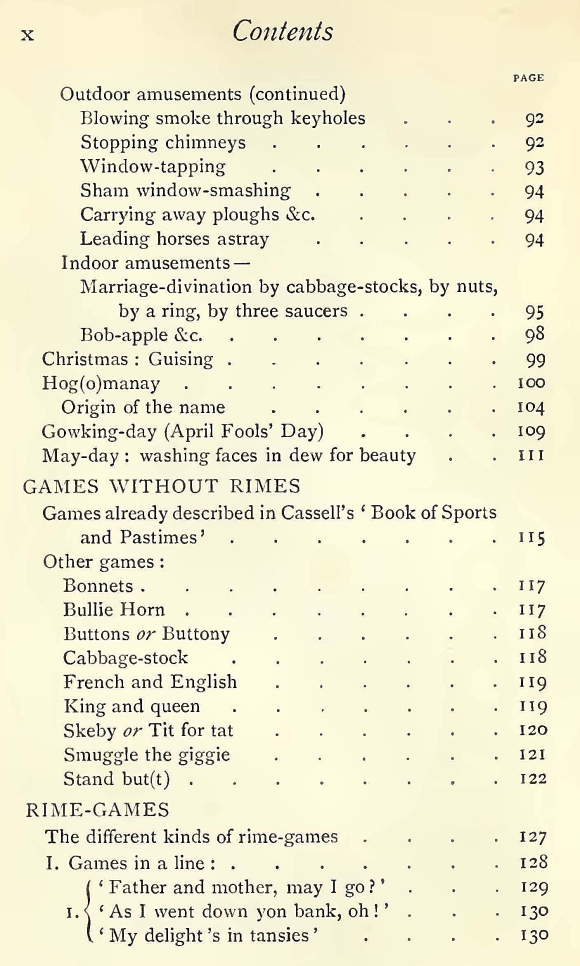
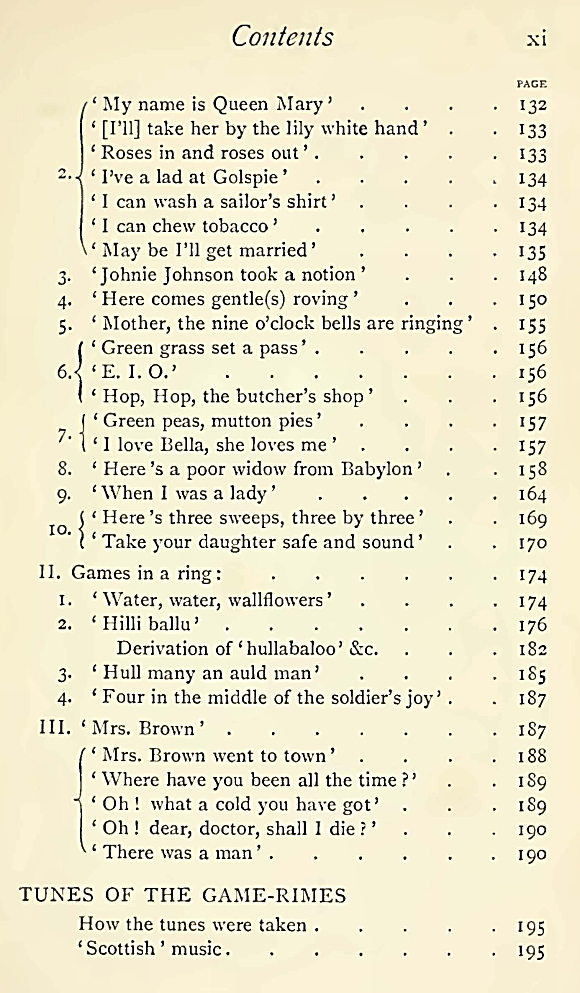
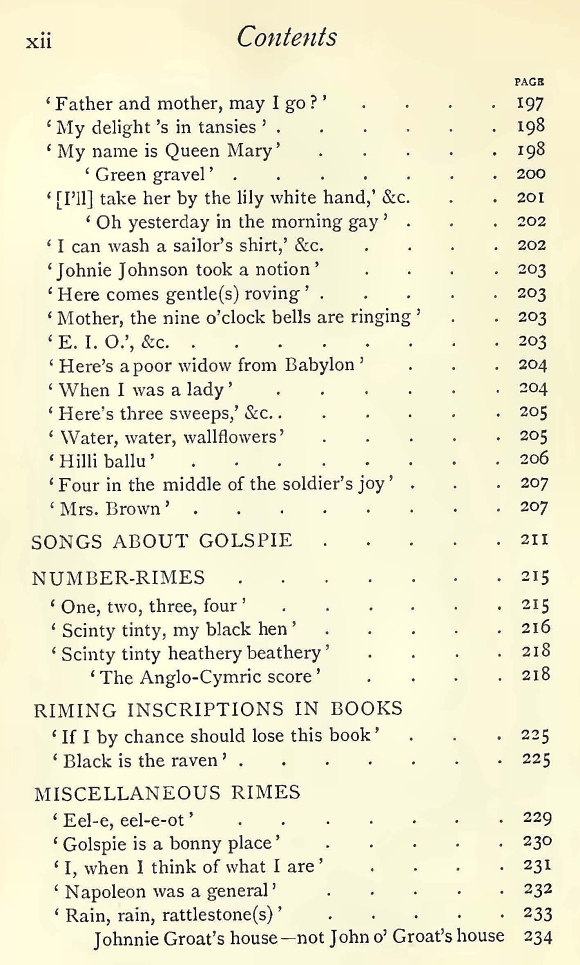
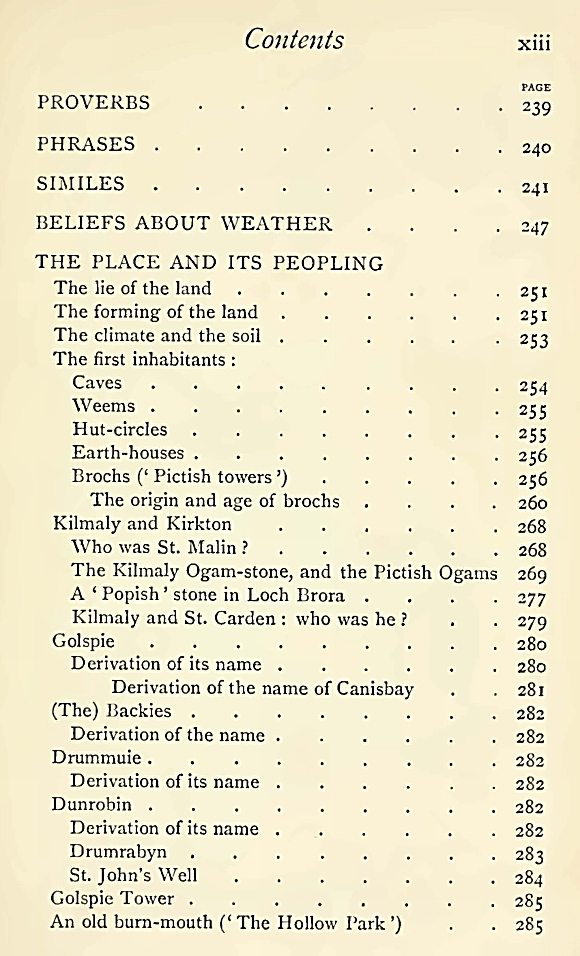
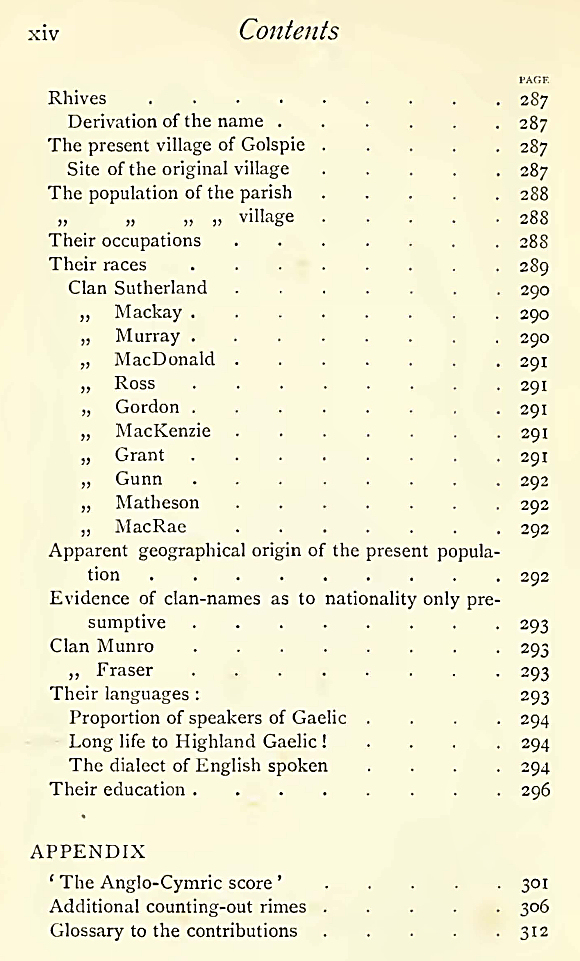
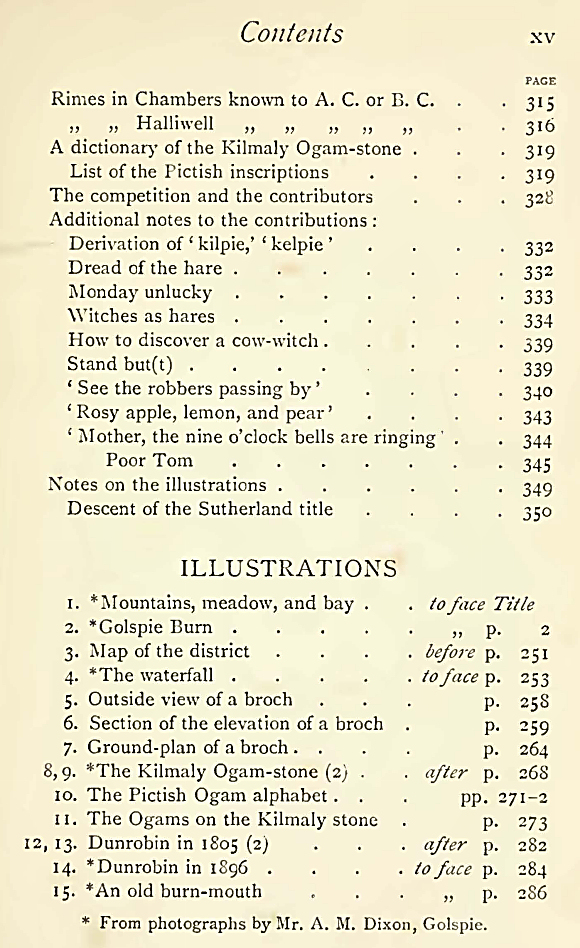
You can download this book
here! (14.3Mb)

